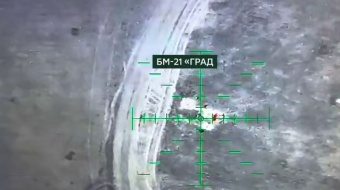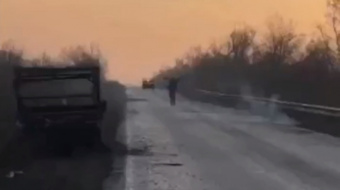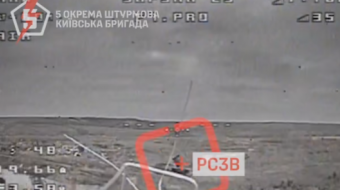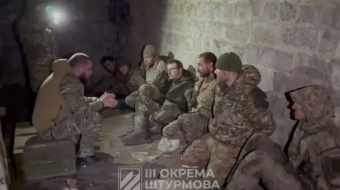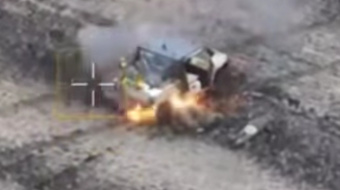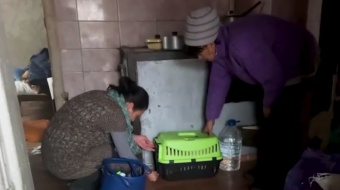Forgotten by children and state. Everyday life of senior IDPs from Donbas. Part 1
Forgotten by children and state. Everyday life of senior IDPs from Donbas. Part 1
There is no more “Dopomoha” (“Aid”) hospeace in Alchevsk any more.
Or, to be precise, its director, Oleh Horbachyov, will never return to the occupied part of the Luhansk region.
A forty-year-old man can now speak about this loss calmly.
He has been trying to survive in Brovary district (the Kyiv region) for two years and he rents a house for his enormous family there. The inhabitants of this house are:
– he himself and his wife,
– their three biological children,
– two adopted children,
– more than twenty internally displaced elderly people who used to be Alchevsk hospeace patients.
Atonement for the lost youth
It all started with a personal history. Oleh Horbachyov’s parents were alcoholics so he was looked after by his grandmother. However, the boy did not appreciate her efforts and followed into his parents’ footsteps.
"I was at the very bottom, I was in it up to my neck”, says the man.
Then, when he touched the bottom, he understood that it was the time to start going up and decided to change his life completely.
In 1998 he came to a rehabilitation centre for alcoholics. The first question that he was asked there was: “Are you hungry?”
Oleh was twenty-six at that time and that simple question made the lad feel ashamed: he really had not eaten for several days before that.
"It was difficult”, remembers the man, “but I managed to do it as I knew for sure that I did not want to go back.”
First, he was helping in the rehabilitation centre as a volunteer.
He did not use to ask newcomers (alcoholics, drug addicts and homeless people) about the reason of their grief and did not try to preach to them, he just asked them the question he had been asked once: if they were hungry.
One day an elderly woman brought her alcoholic son to the centre and also asked for a shelter for herself.
A little later, another elderly woman came: her son had returned from prison and was beating her, taking her money away and did not let her enter the house.
Day by day the centre became full of elderly people who had no place to go due to different reasons.
Looking after those abandoned and miserable old retirees, Oleh suddenly understood that it was a kind of atonement for the way he used to treat his own late granny when he was young.
It was in 2001.
Having covered the way from a nursing assistant to a director of the centre, Oleh changed the place he worked at and turned it into a hospeace for the elderly.
“There were so many of them — homeless elderly ladies and gentlemen and they had no one to care of them”, explains the man.
Oleh and his evacuated house
“Dopomoha” (“Aid”) hospeace for elderly people was situated on rented premises in Alchevsk, there were three detached houses which had been built in the USSR times, and it could place up to one hundred people at a time.
"The houses were not equipped well enough for a hospeace, they was not refurbished either, but for people who had not had homes for years even it was good enough”, remembers the man.
Still, Oleh was dreaming of a specialized hospeace in his native town. “Those were old people, they needed to have toilets within easy reach, wheelchair ramps for disabled ones.”
So, he started building a house with the help of businesses, international funds and community. It had to be a house for fifty people, elderly and disabled ones who could not be cared for by the state due to different reasons: some of them had lost their documents, some of the them had not had them for years: “There were people with Soviet passports in our home, who would have accepted those documents at state institutions?”
However, the building which had started in Alchevsk had never finished. In the summer of 2014 Oleh was concerned with other problems - he had to hide his elderly patients from the war.
Now, he lives nearly eight hundred kilometres away from home and rents a three-storey house where more than twenty elderly IDPs can live.
Evacuation of senior patients was conducted in three stages and still, Oleh did not manage to take everyone away.
"There were fifteen bedridden people they would not have survived the transportation”, says the man.
He evacuated nearly all of them himself, by his old “Volga” car. Now, the car is parked in the middle of the yard and it is more of a museum showpiece, it broke down and the owner says it cannot be repaired.
Oleh has to pay twelve thousand hryvnyas rent monthly. As it was in his native Alchevsk, he gets some help from business, international funds and indifferent people.
"I am not surprised any more when people tell me: “But those are seniors, they get pensions!” Of course, they do, but only ten of them and that is only ten thousand hryvnyas. I should feed more than thirty people with this money and pay the rent”, says Oleh Horbachov, director of the hospeace.
He says "more than" deliberately as the number of the hospeace residents changes all the time. Recently, two elderly people have been buried.
"They are here till...", the man interrupts himself.
Pics courtesy of UN Refugee Agency in Ukraine.
Katya Lutska for UP. Life.
New service "Explain Ukraine". This is a daily mailout of two articles which were written about the situation in the Donbas by Donbas journalists and translated into English. Honest vision of people who work in the field is unbiased and fresh which is crucial in the world which is full of desinformation and propaganda. We try to share this vision in out daily mailout. You can subscribe here.










